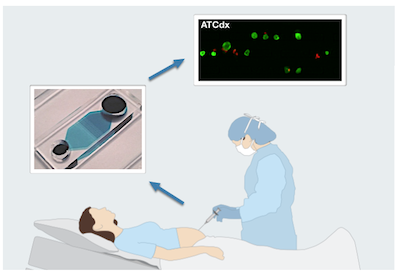Repurposing often discarded ascites
The buildup of cancer-containing fluid in the abdomen (ascites) is a common occurrence suffered by many patients with advanced malignancies, notably ovarian or gastrointestinal. Bloating and abdominal pain are hallmarks of ascites relieved only by treating the underlying cancer — easier said than done — or by draining the fluid (paracentesis). Per today’s clinical standards, analyzing the cancer cells floating within ascites is most useful when the diagnosis remains unclear. Once a diagnosis is attained, repeat paracenteses are mainly palliative with the collected ascites (oftentimes a couple or more liters) discarded afterwards without further analyses. Scientists from the Massachusetts General Hospital’s Center for Systems Biology and Cancer Center have created and tested, using ascites from 46 advanced ovarian cancer patients, a novel, point-of-care microfluidic device that selectively identifies and captures ascites tumor cells (ATCs) for broader testing. This advance is important for various reasons.

First, besides tumor cells, ascites actually comprises a much higher number of inflammatory and red blood cells; this heterogeneous mixture challenges accurate and practical point-of-care interrogation without the use of bulky and expensive equipment such as centrifuges and flow cytometry. Importantly, MGH researchers demonstrate the potential of their ATC chip using only microliter amounts absent any need for additional equipment. Moreover, since ascites is often drained and discarded repeatedly due to re-accumulation, the researchers demonstrated the value of serially profiling ATCs using the chip. The increased mechanistic insight into one’s tumor biology conferred by this novel point of care testing approach could re-purpose ascites from discarded ‘trash’ to valuable ‘treasure’ of useful information for monitoring disease progression and treatment response.
Vanessa Peterson, PhD, Cesar M. Castro, MD, and Ralph Weissleder MD, PhD co-led this study conducted alongside other CSB investigators and clinical colleagues at the Cancer Center. It is published in the Proceedings of the National Academy of Sciences
Written by Yvonna Fisher-Jeffes, PhD
Peterson VM, Castro CM, Chung J, Miller NC, Ullal AV, Castano MD, Penson RT, Lee H, Birrer MJ, Weissleder R
Ascites analysis by a microfluidic chip allows tumor-cell profiling
Proc Natl Acad Sci U S A. 2013;110(51):E4978-86 – PMID: 24297935 – PMCID: PMC3870756
Press Coverage
MGH Press Release
Post Doc Journal – Tumor Cells Are the Dip on This Chip (pdf)